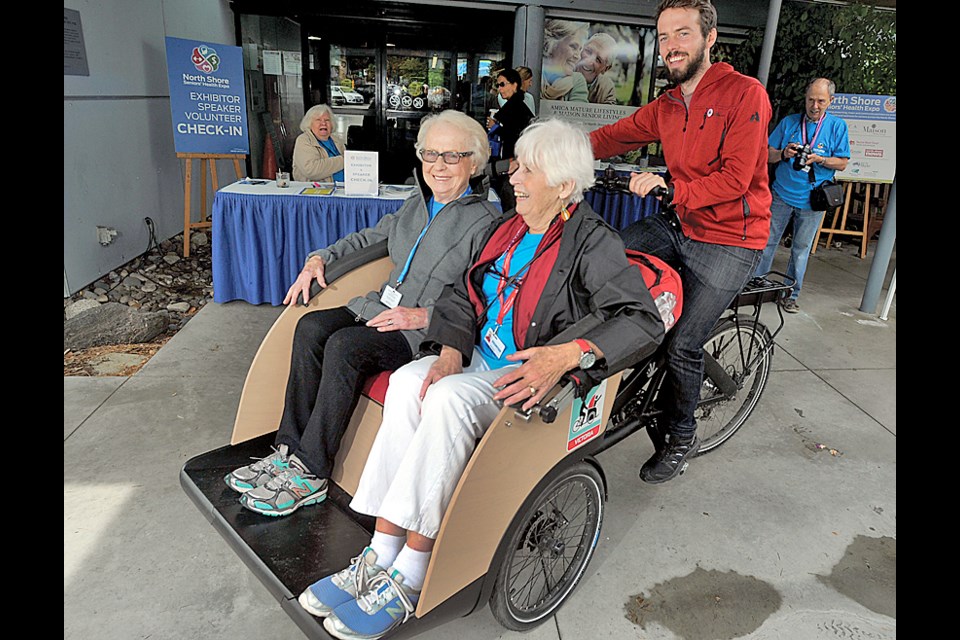Many people have suggested I do a column on seniors and driving and I must admit I took this on with some trepidation.
Seniors driving is, to my mind, fraught with a number of issues: Should there be a mandatory age limit for seniors to get retested or go through a medical exam? Should seniors be required to give up their driver’s licence at a certain age? Do seniors cause the most accidents on the road and if seniors stop driving, for whatever reason, are there good alternative transportation options?
According to the B.C. government’s website on seniors and driving: “Everyone’s driving skills change over time, but it can be difficult to recognize when adjustments are needed, or when it is time to retire from driving.”
As Dr. Jamie Dow, the medical adviser on road safety for the Société de l'assurance automobile du Quebec, a Crown corporation responsible for licensing drivers and vehicles, in a Globe and Mail article from earlier this year states: “The mere fact that you are old doesn't mean you have a problem. The fact that you are older does make you are more susceptible to having a problem."
The province of B.C. has mandated 80 years old (and every two years after that) as the age at which a senior must be assessed by their doctor and submit a medical report (DMER) to RoadSafetyBC.
But why is 80 the age at which we prescribe a mandatory test?
Much research indicates that as we age we experience many health-related issues which may impact driving.
These include eyesight and hearing impairments, chronic conditions requiring medication with problematic side effects, slowed co-ordination and reduced range of motion (possibly associated with arthritis), and mild cognitive decline.
In addition, seniors face increasing challenges with the changing landscape (road construction, building projects) faster highways and new traffic signs with new symbols.
However, Isobel Mackenzie, the provincial seniors advocate, in her May 2018 report Seniors Transportation: Affordable, Appropriate and Available, has expressed concerns around the fairness of the DMER for all individuals who are 80 years of age or older, regardless of driving record.
She has also expressed concerns about the cost of the test, recommending that all Class 5 licence renewals that require a DMER be treated the same.
This would result in physician reimbursement of $75 for those who are required to complete the DMER because they are age 80 or older.
But what about age discrimination?
According to the 2015 article Profile of Seniors Transportation Habits, author Michael Turcott states: “Although most seniors drive carefully, statistics show that people aged 70 or older have a higher accident rate per kilometre driven than any other age group except young male drivers, still the highest risk category.
In addition, seniors are more likely than younger people to be killed when they are involved in a collision. We don’t require young male drivers to be retested, however.”
Not all seniors drive after 85, as the seniors advocate report suggests, “92 per cent of seniors aged 65-69 hold an active driver’s licence, this decreases to 34 per cent for seniors aged 85 and older, meaning the majority of our oldest seniors are relying on alternative forms of transportation to get around.”
The advocate recommends that the government and community work on solutions to provide good, accessible and viable transportation options.
Transportation is a key factor in keeping seniors active in the community, for decreasing isolation and increasing socialization.
Seniors isolation caused by a lack of transportation options can seriously affect people’s health.
If you want to continue to drive you might consider these tips: stay physically active; stay healthy; schedule regular vision and hearing tests; manage any chronic conditions; understand your limitations; drive when the roads, and you, are in good condition; stash your cellphone and focus on the road; and update your driving skills.
Also, many articles about seniors driving and their vehicles suggest getting a car which assists seniors in getting around safely.
These cars could include adaptive/smart headlights, backup cameras, blind spot monitors, forward collision warning/mitigation systems, and lane departure warning/lane keeping assist systems.
As Brendan McAleer, in a 2017 North Shore News article notes, “If you’re buying your ‘last’ car, the one that’s going to run out your driving career, consider making sure it’s got that added level of safety just in case. You don’t want to hurt anyone.”
To my mind the issue is about keeping the road safe for everyone.
We shouldn’t discriminate on the basis of the age of a driver, we should make sure testing and medical exams are fair and not costly and the government and community should make alternative transportation systems a viable option for seniors.
Margaret Coates is the co-ordinator of Lionsview Seniors’ Planning Society. She has lived on the North Shore for 48 years and has worked for and with seniors for 20 of those years. Ideas for future columns are welcome Email: [email protected].



